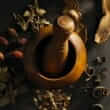Background
- Ba ji tian, also known as Morinda officinalis, has a slightly curved, yellowish-gray root that is odorless and sweet to slightly sour in taste. This root may be stir-fried and eaten, or it may be used as medicine.
- The root of Morinda officinalis has been used in traditional Chinese medicine since ancient times. It is believed to strengthen the bones and tendons, as well as treat infertility, missing menstrual periods, blood clots during menstruation, and other sexual health problems. The root may also relieve symptoms of back pain and muscular atrophy, a condition in which muscle wastes away. The fruit of Morinda officinalis is called the noni berry and has gained popularity in the United States and other Western countries.
- Ba ji tian may have benefits for patients with cancer, depression, fatigue, inflammation, osteoporosis, memory problems, high blood glucose, or kidney disease. However, more studies are needed to confirm the use of Morinda officinalis in medicine. At this time, there is a lack of evidence to support the effectiveness of Morinda officinalis for any condition.
References
- Chang, M. S., Kim, W. N., Yang, W. M., Kim, H. Y., Oh, J. H., and Park, S. K. Cytoprotective effects of Morinda officinalis against hydrogen peroxide-induced oxidative stress in Leydig TM3 cells. Asian J Androl 2008;10(4):667-674. View Abstract
- Choi, J., Lee, K. T., Choi, M. Y., Nam, J. H., Jung, H. J., Park, S. K., and Park, H. J. Antinociceptive anti-inflammatory effect of Monotropein isolated from the root of Morinda officinalis. Biol Pharm Bull 2005;28(10):1915-1918. View Abstract
- Cui, C., Yang, M., Yao, Z., Cao, B., Luo, Z., Xu, Y., and Chen, Y. [Antidepressant active constituents in the roots of Morinda officinalis How]. Zhongguo Zhong.Yao Za Zhi 1995;20(1):36-3. View Abstract
- Hsieh TC and Wu JM. Ethanolic extracts of herbal supplement Equiguard (TM) suppress growth and control gene expression in CWR22Rv1 cells representing the transition of prostate cancer from androgen dependence to hormone refractory status. International Journal of Oncology 2008;32(1):209-219.
- Kim, I. T., Park, H. J., Nam, J. H., Park, Y. M., Won, J. H., Choi, J., Choe, B. K., and Lee, K. T. In-vitro and in-vivo anti-inflammatory and antinociceptive effects of the methanol extract of the roots of Morinda officinalis. J Pharm Pharmacol 2005;57(5):607-615. View Abstract
- Li, J., Zhang, H. L., Wang, Z., Liang, Y. M., Jiang, L., Ma, W., and Yang, D. P. [Determination content of the antidepressant extraction and analysis the trace elements from Morinda officinalis]. Zhong.Yao Cai. 2008;31(9):1337-1340. View Abstract
- Li, N., Qin, L. P., Han, T., Wu, Y. B., Zhang, Q. Y., and Zhang, H. Inhibitory effects of morinda officinalis extract on bone loss in ovariectomized rats. Molecules. 2009;14(6):2049-2061. View Abstract
- Li, Y. F., Gong, Z. H., Yang, M., Zhao, Y. M., and Luo, Z. P. Inhibition of the oligosaccharides extracted from Morinda officinalis, a Chinese traditional herbal medicine, on the corticosterone induced apoptosis in PC12 cells. Life Sci 1-10-2003;72(8):933-942. View Abstract
- Li, Y. F., Liu, Y. Q., Yang, M., Wang, H. L., Huang, W. C., Zhao, Y. M., and Luo, Z. P. The cytoprotective effect of inulin-type hexasaccharide extracted from Morinda officinalis on PC12 cells against the lesion induced by corticosterone. Life Sci 8-13-2004;75(13):1531-1538. View Abstract
- Li, Y. F., Yuan, L., Xu, Y. K., Yang, M., Zhao, Y. M., and Luo, Z. P. Antistress effect of oligosaccharides extracted from Morinda officinalis in mice and rats. Acta Pharmacol Sin. 2001;22(12):1084-1088. View Abstract
- Qiao, Z. S., Wu, H., and Su, Z. W. [Comparison with the pharmacological actions of Morinda officinalis, Damnacanthus officinarum and Schisandra propinqua]. Zhong.Xi.Yi.Jie.He.Za Zhi 1991;11(7):415-7, 390. View Abstract
- Soon, Y. Y. and Tan, B. K. Evaluation of the hypoglycemic and anti-oxidant activities of Morinda officinalis in streptozotocin-induced diabetic rats. Singapore Med J 2002;43(2):077-085. View Abstract
- Wu, Y. J., Shi, J., Qu, L. B., Li, F. F., Li, X. J., and Wu, Y. M. [Determination of antioxidation of the extract from Chinese medicine Morinda officinalis How by flow injection chemiluminescence and spectroscopy]. Guang.Pu.Xue.Yu Guang.Pu.Fen.Xi. 2006;26(9):1688-1691. View Abstract
- Zhang, H. L., Li, J., Li, G., Wang, D. M., Zhu, L. P., and Yang, D. P. Structural characterization and anti-fatigue activity of polysaccharides from the roots of Morinda officinalis. Int J Biol Macromol. 4-1-2009;44(3):257-261. View Abstract
- Zhang, Z. Q., Yuan, L., Yang, M., Luo, Z. P., and Zhao, Y. M. The effect of Morinda officinalis How, a Chinese traditional medicinal plant, on the DRL 72-s schedule in rats and the forced swimming test in mice. Pharmacol Biochem Behav 2002;72(1-2):39-43. View Abstract







